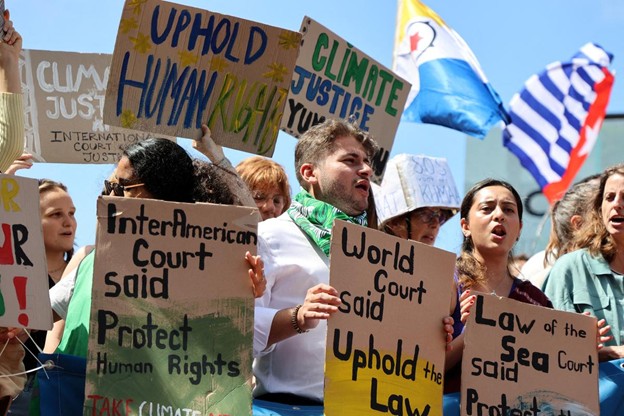



In a landmark advisory opinion, the International Court of Justice (ICJ) ruled that countries are legally obligated under international law to combat climate change and may face liability for harm caused, especially if they fail to protect basic human rights affected by climate impacts. The decision strengthens the legal basis for climate justice, particularly benefiting vulnerable nations.

Disclaimer: Copyright infringement not intended.
Context:
The UN’s top court ruled that failure to act on climate change may breach international law, with affected nations possibly entitled to reparations.
In a historic development, the International Court of Justice (ICJ) delivered a landmark advisory opinion on July 23, 2025, recognizing the obligation of states under international law to take concrete action against climate change. This ruling, prompted by a request from the United Nations General Assembly, marks the first time the world’s top court has weighed in on the legal responsibilities of countries in addressing global warming.
The ICJ’s advisory opinion stems from a resolution passed in March 2023, led by Vanuatu and supported by over 130 countries, asking the court to clarify whether states have a legal obligation to protect the climate system and whether failure to act could lead to legal consequences. It follows a broader global effort to recognize climate change as a human rights issue, particularly for vulnerable island nations.
|
Issue |
ICJ Ruling |
|
Legal obligations of states |
The ICJ held that existing international treaties and conventions, including the UN Framework Convention on Climate Change (UNFCCC) and Paris Agreement, compel nations — particularly industrialized ones — to reduce greenhouse gas emissions. |
|
Human rights implications |
The Court recognized that the impacts of climate change — such as rising sea levels, heatwaves, and extreme weather — violate fundamental human rights, including the right to life, health, and an adequate standard of living. |
|
State responsibility |
Countries that fail to act or contribute significantly to emissions could be in breach of international law and may be liable to pay reparations to affected nations. |
|
Differentiated responsibilities |
The Court emphasized the principle of Common But Differentiated Responsibilities (CBDR), underscoring that wealthier nations have a greater duty to curb emissions and provide support to developing nations. |
India has consistently emphasized equity and CBDR, and this ruling aligns with its longstanding call for climate justice. It strengthens India's position in international climate negotiations and enhances its diplomatic leverage in seeking greater climate finance and technology transfers. However, India must also continue its domestic climate commitments, including achieving net zero by 2070, enhancing renewable energy capacity, and addressing climate vulnerabilities in its own territory.
The ICJ’s advisory opinion is a moral and legal milestone in the global climate fight. It elevates the urgency of climate action from a political and scientific issue to a legal and ethical imperative. While enforcement remains a challenge, this ruling could catalyse a wave of climate accountability and justice-based climate governance in the years to come.
Source: The Hindu
|
PRACTICE QUESTION Q. “The ICJ’s climate advisory opinion marks a new era of legal accountability in global climate governance.” Critically examine its implications for climate justice and India’s position in international climate negotiations. (250 words). |




© 2026 iasgyan. All right reserved